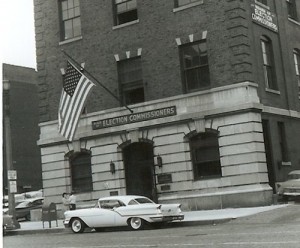Some Seek To Lower Missouri’s Voting Age

In early December news came out about a proposed change to Missouri’s voting age:
Democratic Rep. Karla May of St. Louis this week filed a joint resolution to amend the state constitution to reduce the legal age to vote from 18 years old.
If passed by both the state House and Senate, the measure would go to a public vote. (Missouri lawmaker wants to lower voting age to 16)
Currently you need to be 17-1/2 to register, 18 to vote. Decades ago the minimum voting age
The long debate over lowering the voting age in America from 21 to 18 began during World War II and intensified during the Vietnam War, when young men denied the right to vote were being conscripted to fight for their country. In the 1970 case Oregon v. Mitchell, a divided U.S. Supreme Court ruled that Congress had the right to regulate the minimum age in federal elections, but not at the state and local level. Amid increasing support for a Constitutional amendment, Congress passed the 26th Amendment in March 1971; the states promptly ratified it, and President Richard M. Nixon signed it into law that July. (History.com)
The following is an argument in favor of lowering the voting age:
FairVote supports expanding suffrage to 16 and 17-year-olds in municipal elections. The proposal to extend voting rights to people after they turn 16 may surprise some, but the latest research is a revelation. All evidence suggests that cities will increase turnout by allowing citizens to cast their first vote after turning 16. The reason is simple. Many people at 16 and 17 have lived in their communities for years and are taking government classes in high school. That combination results in more people exercising their first chance to vote if they are 16 or 17 than if they are unable to vote until they have left home and school.
A voting age of 18 means that many people won’t get a chance to vote in city elections until they are nearly 20. A detailed study of voting age and voters in Denmark found that 18-year-olds were far more likely to cast their “first vote” than 19-year-olds, and that every month of extra age in those years resulted in a decline in “first vote” turnout. Allowing 16- and 17-year-olds to vote in local elections will enable them to vote before leaving home and high school, and establish a life-long habit of voting.
Lowering the voting age to 16 is becoming an international movement. A growing number of nations like Austria, Argentina, Germany and the United Kingdom that have extended voting rights to people at 16 for national, regional or local elections. Evidence from Austria confirms that extending voting rights to people after they turn 16 promotes higher turnout for first-time voters and over time. Austria’s experience also shows that 16- and 17-year-olds are ready for voting as far as making choices that accurately reflect their views.
Long-time backers of a lower voting age, like the National Youth Rights Association, make a fairness argument as well. Turning 16 has special significance in our culture. At age 16, we can drive, pay taxes and for the first time work without any restriction on hours. Many states already allow citizens under 18 to vote in Democratic and Republican primaries for president, Congress and governor. (FairVote)
I hadn’t read the above before the poll, I’m liking the idea of 16 for local elections, 18 for state & national, just not sure if that would be an administrative nightmare or not.
When I checked the Sunday Poll results about 3-4 hours before it closed the number of votes was low and keeping the age at 18 had a majority of votes, but by bedtime it was clear a group decided to push the “15 or lower” answer.
Q: What should the voting age be in Missouri?
- 15 or lower: 50 [65.79%]
- 18: 18 [23.68%]
- 16: 5 [6.58]
- 21: 1 [1.32%]
- 22 or higher: 1 [1.32%]
- Unsure/No Opinion: 1 [1.32%]
I would’ve been pleased if the total of all votes was 50, but that’s how many voted for 15 or lower late in the day, it had maybe 1 vote earlier. To my knowledge no state vote to lower the voting age below 18 has been successful.
— Steve Patterson
I’ve been voting since I was 18, back when Kentucky was one of two states that allowed it (in 1971, when every other state was 21). I’m not sure if allowing those under 18 to vote would be a good thing, given their lack of maturity, the lack of a grasp on the consequences of their votes and a general disinterest in the political process . . . but the same argument can be made about the low-information voters who are over 18 and still allowed to vote, now! Realistically, if you’re paying taxes, you should have a say in how they’re going to be spent, and if you’re working and paying taxes at 16, why not? But if you’re not working and just paying taxes on the stuff your parents’ allowance let’s you buy, umm . . . NO!